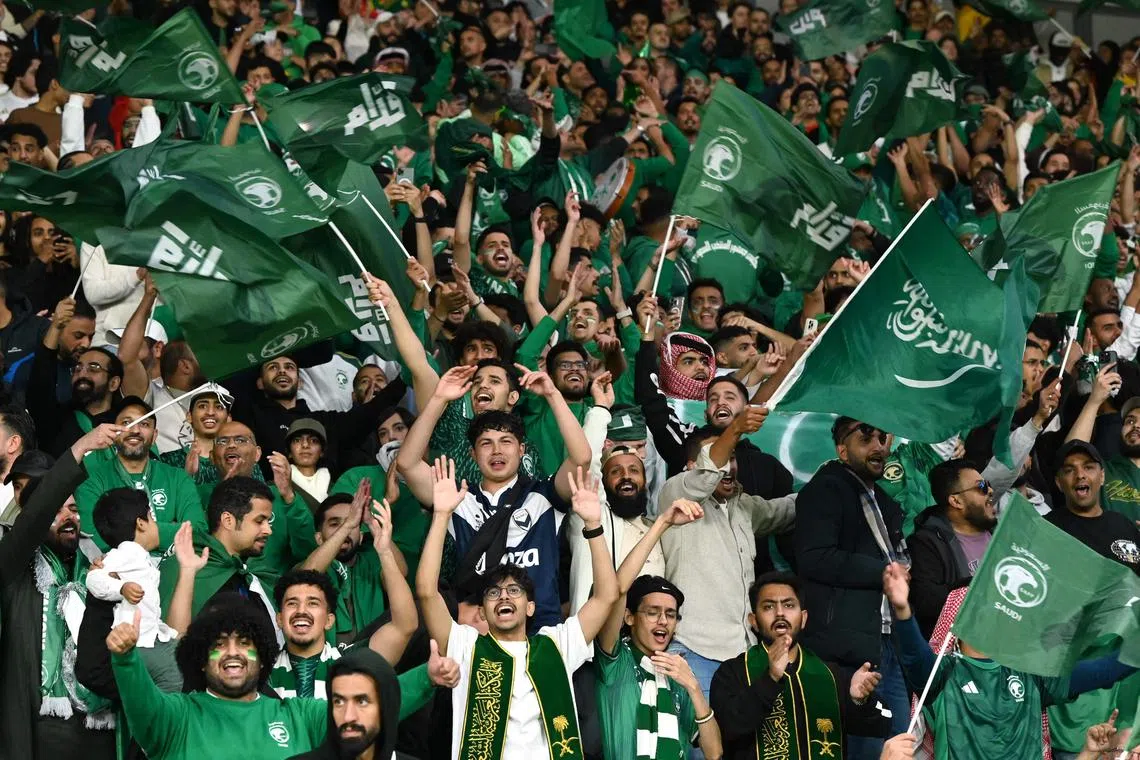Saudi has ‘come a long way’ in human rights: Bid chief
Sign up now: Get the biggest sports news in your inbox

Supporters of Saudi Arabia react during a 2026 World Cup qualifying match against Australia.
PHOTO: AFP
Follow topic:
RIYADH – Hammad Albalawi, head of Saudi Arabia’s 2034 World Cup bid, stated that the country has made significant progress in human rights while aiming to attract “more fans than ever” to the 48-team event.
Saudi Arabia is the sole bidder for the 2034 global football showpiece, with Fifa set to vote on it on Dec 11 amid concerns about the Gulf state’s human rights record.
Albalawi said that the strides in human rights, especially in labour laws, are part of Saudi Arabia’s commitment to transforming its social and economic landscape under Vision 2030.
“We have come a long way and there’s still a long way to go,” he told Reuters.
“Our principle is to develop something that is right for us. Our journey started in 2016, and not because of the World Cup bid.
“We’ve launched initiatives granting employees the freedom to move between employers.
“Documents of these employees are now uploaded into government systems, ensuring they have rights within their contracts.
“These are substantive examples, not because we’re bidding for the World Cup, but because this is part of Vision 2030. This is part of who we are and what we are committed to.”
He added: “Our aim and aspiration is to bring more teams and more fans into one place than ever before.”
Amnesty International and the Sport & Rights Alliance said in November that Fifa must halt the process to pick Saudi Arabia as hosts of the 2034 tournament, unless major human rights reforms are announced before the vote.
Albalawi also said that the World Cup will be held in a safe and family-friendly environment that visitors will enjoy inside and outside the stadiums regardless of the sale of alcohol, which was banned at the 2022 World Cup in neighbouring Qatar.
“I think today what you see in Saudi Arabia is an environment that is family-friendly, safe and secure,” he said.
“We’ve had over 100 global sporting events that already have taken place in Saudi Arabia.
“We had three million sports fans come in and enjoy those tournaments that have come and come again.”
He pointed to the rapid development of Saudi women’s football and its infrastructure as well as examples of the country’s development and social changes.
“Three years ago, there were zero girls playing football in school because the facilities weren’t there,” he said. “Today, we have over 80,000 girls playing football.”
In related news, the International Olympic Committee (IOC) said on Dec 3 that the 2034 World Cup, which is expected to be held in the cooler months should it be in Saudi Arabia, is unlikely to clash with the Salt Lake City Winter Olympics.
Fifa has said the Saudi bid did not stipulate a proposed window for the World Cup but they would collaborate with stakeholders to “determine the optimal timing” for the tournament, given the country’s hot climate.
The IOC, however, has no concerns over a potential clash with the Salt Lake City Games from Feb 10-26, 2034, as the World Cup is likely to be from late November to mid-December.
“I think the risk of having those two (events) in parallel is immensely limited,” Olympic Games executive director Christophe Dubi said.
“With these two in different countries and continents, from all standpoints, including a commercial one, we have virtually no risk.” REUTERS

